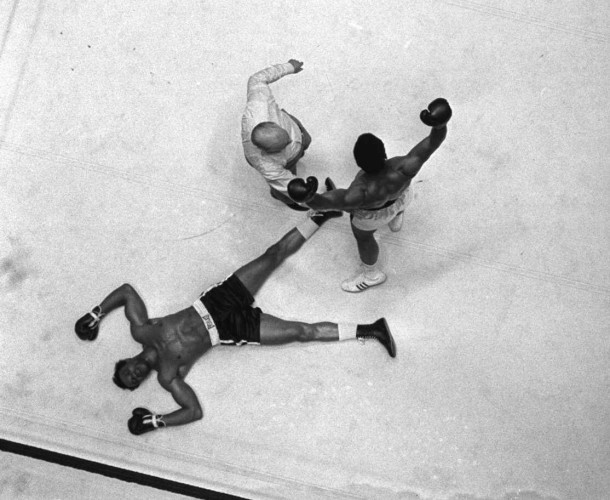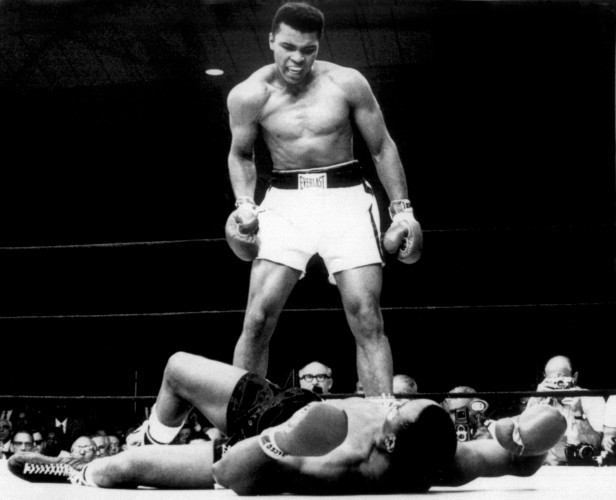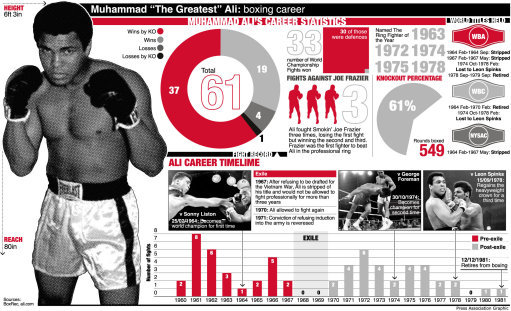“I DON’T ALWAYS know what I’m talking about but I know I’m right.”
On January 17, 1942, Odessa Clay gave birth to a son Cassius in Louisville, Kentucky. Named after his father, Clay would go on to be widely regarded as not only the greatest boxer of all time but also an outspoken critic of the political and cultural status quo in the United States.
Clay was introduced to boxing at the age of 12 by Joe Martin, a local police officer who, according to legend, found the youngster fuming over a stolen bicycle. He was introduced to Fred Stoner who would work with Clay throughout his amateur career.
The young Clay became used to the limelight from an early age, appearing on a local TV show hosted by Martin called Tomorrow’s Champions for the princely sum of $4 a week.
Between the ages of 12 and 18, Clay won six Kentucky ‘Golden Glove’ titles, two national ‘Golden Gloves’ titles and a National Amateur Athletic Union crown. To top it all off though, Clay won light heavyweight gold at the 1960 Rome Olympics, beating Poland’s Zbigniew Pietrzykowski in the final.
Clay made his professional debut just a few months later, beating Tunney Hunsaker on 29 October, 1960. Over the next two years, Clay won 19 fights in a row, 15 by knockout, defeating opponents such as George Logan, Doug Jones and, famously, Henry Cooper.
With Angelo Dundee now in his corner, there was nobody — save for world heavyweight champion Sonny Liston — left for Ali to fight by late 1963. The bout had to happen and so it was set for February 1964.
Liston, known as ‘Big Bear’, had almost twice as much professional experience as Clay with just one defeat in 36 fights. Before the start of the seventh round, Clay was the new champion, yelling a the assembled media: “I’m the greatest, I shook up the world.”
Two days after the fight, on February 27, 1964, Clay declared he was a member of the Nation of Islam, briefly changing his name to Cassius X before, on 6 March, he took the name Muhammad Ali.
Ali wouldn’t have a chance to defend his title until May 1965 when he again beat Liston, this time in the first round, before making eight more defences of his title with only two bouts – George Chuvalo and Ernie Terrell – going the distance.
Six days after beating Zora Folley in New York on 22 March, 1967, Ali was stripped of his titles and his boxing licence revoked for refusing to accept the US Army draft and serve in Vietnam. Ali had failed a draft qualifying exam in 1964 because of his poor reading and writing skills.
However, though the acceptance criteria was changed in 1966 making the fighter eligible again, Ali considered himself a conscientious objector as war was against the teachings of Islam.
In June 1967, Ali was sentenced to five years in prison and fined $10,000 but would serve no jail time and his conviction was later overturned by the US Supreme Court.
He would not, however, fight again until October 1970 when he beat both Jerry Quarry and Oscar Bonavena in quick succession before setting up the ‘fight of the century’ with the undefeated undisputed heavyweight champion of the world, Smokin’ Joe Fraizer.
Though Ali dominated the early stages, Frazier dominated from the fourth round on and won by unanimous decision to inflict the first defeat of Ali’s career. Frazier would go on to lose his title to George Forman in 1973, the same year Ali lost the second fight of his professional career in a split decision against Ken Norton.
Ali avenged that defeat in September of 1973, the first of three wins — including a rematch with Fraizer — to set up the ‘Rumble in the Jungle’ with the 40-0 Geroge Foreman. At 32, Ali was giving the more powerful Foreman eight years and went into the fight as the underdog.
‘The Greatest,’ though, had a plan. From the second round on, Ali leaned on the ropes and covered up, allowing Foreman to connect with many punches to his body and arms but without doing much damage. Rope-a-dope was born.
The champion began to physically tire after several rounds of this and by the eighth, Ali was well in control and, towards the end of the round, landed a five-punch combination that knocked Foreman down and though he stood up on the count of nine, the referee stopped the bout and Ali was once again the champion of the world.
Though Ali would fight and beat Frazier again in the ‘Thrilla in Manila,’ uninspiring bouts against the likes of Joe Bugner and Jean Pierre Coopman were followed by a controversial decision win over Norton again in September 1976.
Having left the Nation of Islam to become a Sunni Muslim, Ali briefly retired to practice his faith before returning to the ring twice in 1977, recording two below-par victories.
In February 1978, aged 36, Ali lost for the third time in his career to Leon Spinks in one of the biggest upsets in sports and though he would avenge that defeat later the same year, an old and slow Ali would lose his last two fights to Larry Holmes and Trevor Berbick to end his professional career in 1981 with 56 wins and five loses.
Three years after he retired, Ali was diagnosed with Parkinson’s though remained publicly active up until 2012 when he was the bearer of the Olympic flag at London 2012.
Outside the ring, Ali was married four times and is survived by his wife Yolanda Williams, seven daughters and two sons and was voted as the BBC Sports Personality of the Century in 1999 after winning by a landslide.
In 2005, the Muhammad Ali Center opened in Louisville to promote the cultural and political values held by the then 63-year old
Muhammad Ali died 3 June, 2016 aged 74, with few to contest his title as the greatest boxer of all time.



